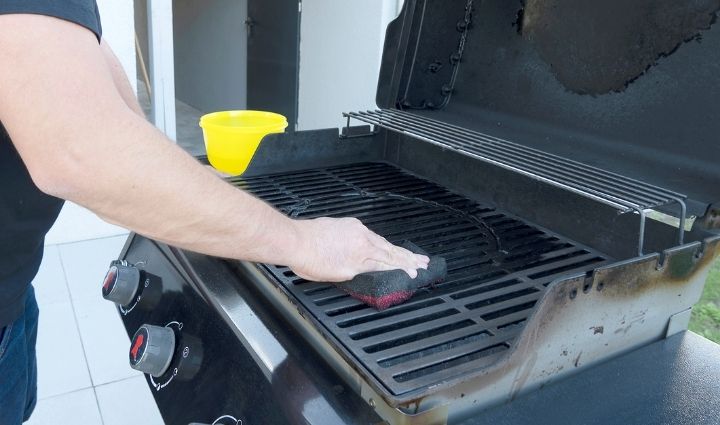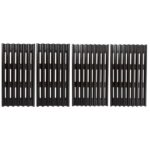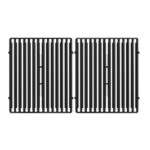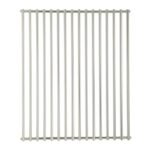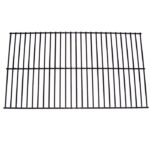Your grill’s cooking grate is one of the most important parts of your gas barbecue. Because It comes into direct contact with your food, grill grates have a significant impact on how your grilled meal turns out both visually and flavorwise.
Not only do they aid in heat transfer, which helps you achieve those coveted perfect grill marks, the grids can also impart flavors to food—though not always ones you want, particularly if the grates are dirty.
Knowing when to clean grill grates and how to do it properly can help significantly extend the lifespan of your grill and improve your grilling results overall. Keep reading to learn how to clean grill grates, including how to clean porcelain grill grates, as well as stainless steel and cast iron grill grates, and when to replace grill grates.
Before we get into how and when to clean grill grates, it helps to understand what grill grates are made of.
What Are Grill Grates Made Of?
Grill grates can be made of many materials. The most common are stainless steel, porcelain-coated steel, and porcelain-coated cast iron. A porcelain enamel coating on grill grates protects the underlying steel or cast iron from rust and decay. In the case of cast iron grates, most manufacturers now use a matte porcelain coating, whereas in the past a glossy enamel finish was more common. Rarely will you find raw or uncoated cast iron grates being sold with a gas grill.
Each type of material offers advantages and disadvantages with different care requirements. Keep reading to learn more.
How and When to Clean Grill Grates
No matter what your grill’s cooking grates are made of, they should always be cleaned after every use. Cleaning after every cookout will prevent the build-up of food and grease, keep away bugs and pests, and ensure that your grill is good to go next time you’re ready to fire it up.
Most grill grates can be cleaned using the same basic method, but some special care needs to be taken depending on the material of the grate.
How to clean stainless steel cooking grates
Stainless steel grates are the least susceptible to rust, but that doesn’t mean they’re immune to corrosion. Follow these steps to clean stainless steel cooking grates:
- Carefully spread a piece of heavy-duty aluminum foil over the grate, then heat the grill up to about 500 degrees for 15 minutes. The foil will concentrate the heat and help burn off any stuck-on food particles.
- Cool the grill and use a non-metal bristle brush to remove any food particles. Avoid using steel wool, which can scratch the surface of stainless steel and create an entry point for rust.
- If any tough food and grease build-up remains, sprinkle baking soda on the grate and spray white vinegar over the baking soda. After the mixture foams, gently scrub it with a grill brush. For super stuck-on food, you can also try soaking the grill grates in hot water with dish soap for 1-2 hours or overnight, then scrub with a heavy-duty scrub pad.
- Once clean, rinse the grates well with water and allow them to dry completely before returning them to your grill.
Stainless steel grill grates don’t need to be seasoned like cast iron grill grates—simply clean and grill! That said, a light coating of oil on the grate or the food itself can help prevent the food from sticking to the grates.
How to clean cast iron grill grates
Stainless steel grates are the least susceptible to rust, but that doesn’t mean they’re immune to corrosion. Follow these steps to clean stainless steel cooking grates:
- Carefully spread a piece of heavy-duty aluminum foil over the grate, then heat the grill up to about 500 degrees for 15 minutes. The foil will concentrate the heat and help burn off any stuck-on food particles.
- Cool the grill and use a non-metal bristle brush to remove any food particles. Avoid using steel wool, which can scratch the surface of stainless steel and create an entry point for rust.
- If any tough food and grease build-up remains, sprinkle baking soda on the grate and spray white vinegar over the baking soda. After the mixture foams, gently scrub it with a grill brush. For super stuck-on food, you can also try soaking the grill grates in hot water with dish soap for 1-2 hours or overnight, then scrub with a heavy-duty scrub pad.
- Once clean, rinse the grates well with water and allow them to dry completely before returning them to your grill.
Stainless steel grill grates don’t need to be seasoned like cast iron grill grates—simply clean and grill! That said, a light coating of oil on the grate or the food itself can help prevent the food from sticking to the grates.
GRILL SPOT TIP: Yes, it’s safe to occasionally use dish soap to clean cast iron! Sometimes, you need dish soap to help lift difficult debris. If you do clean your grates with dish soap, take extra care to re-season them properly—soap can strip away the non-stick surface that develops when you bake oil into the iron. And never soak cast iron in soapy water (or any water!).
How to clean porcelain steel grill grates
Glossy porcelain-enameled grill grates are easy to clean, but require a bit of extra caution. The porcelain surface can easily be compromised by a vigorous cleaning, increasing the potential for chips and rust that will significantly shorten the lifespan of your grill grate. Follow these steps to clean porcelain grill grates:
- Heat up the grill to burn off any excess food, then turn off the grill and let it cool.
- Using a soft bristle brush, brush diagonally across the grates in smooth, fluid motions to remove food and debris. Diagonal motions make it easier to remove food and grease, but be careful not to scrub too hard or you risk damaging the surface of the grate.
- For deep cleaning, mix a solution of 6 parts baking soda and 2 parts warm water and apply the paste to the grates. Let the paste sit for 20 minutes, then clean with a soft bristle brush.
There’s no need to reseason a glossy porcelain-coated grill grate, but as with stainless steel grates, a light coating of vegetable oil on the grate or the food itself will prevent sticking
GRILL SPOT TIP: Always use a soft non-metal bristle brush or a scouring pad to clean porcelain grill grates—metal wire brushes can easily scratch the porcelain surface. If you don’t have a non-metal bristle brush, a medium-firm toothbrush will get the job done.
When To Replace Grill Grates
The lifespan of grill grates varies widely depending on the type and quality of material they are made of, the frequency of use, the type of cooking being done (acidic marinades can speed up corrosion, for example), and how well they’ve been cared for. Properly caring for and maintaining your grill grates will keep them in good condition for years
3 signs it’s time to replace your grill grates
There are three undeniable signs it’s time to replace your grill grates:
1. Rust
All grill grate materials are susceptible to rust without regular cleaning. Rust doesn’t exactly add an appetizing flavour, and it can actually pose a health risk if the metals flake off into your food.
Surface rust can often be scraped away with steel wool or other abrasive materials like a wire brush, but deep rust cannot be cleaned. If the rust doesn’t disappear with a cleaning and has penetrated deep into the metal, it’s time to replace your grill grates.
GRILL SPOT TIP: A small amount of rust can often be cleaned with a safe, abrasive material like a nylon brush, and is nothing to worry about regardless of what material your grill grates are made of. If your grill grates are covered in rust or the rust has penetrated deep into the metal, then you should consider replacing them.
2. Chips
Glossy porcelain-enameled grill grates are susceptible to chipping. A chipping finish poses a health risk if any porcelain chips end up in your food. It also creates an uneven cooking surface that will make it harder to grill and opens up an entry point for moisture, increasing the likelihood of rust. If you notice your grate’s finish is significantly chipped, it’s time to replace your grill grate.
3. It just won’t clean
If there are seriously stuck-on bits of food and built-up debris and grease that simply won’t clean away no matter how hard you try, it’s time to replace your grill grate.
How To Replace Grill Grates
Grill grates are super easy to replace. Grates are designed to be removed easily for cleaning, so all you have to do is lift out the old one and pop in the new one.
The hardest part of replacing a grill grate is to find the right size and material for your grill. When you’re replacing a grill grate, we recommend looking for a replacement grate that uses the same materials as your grill’s original manufacturer. As long as you get the right size, you can also swap your current grill grates for a new one that uses a different material.
What Kind of Grill Grates are Best?
What kind of grill grates are best for you depends on how you grill and your personal preferences.
- Stainless steel grill grates are extremely durable and resistant to corrosion. They have a long lifespan, but they are typically harder to keep clean.
- Cast iron grill grates have excellent heat retention and have a long lifespan, particularly if they’re properly maintained. They require more care and attention than stainless steel grates, but are the best for achieving a good sear and grill marks.
- Porcelain coated steel grill grates are typically a more affordable grate option and are most commonly found on entry level gas grills. They have the shortest lifespan of any grill grate, but perform admirably and offer the best of both worlds—high heat for searing and grill marks like cast iron, and easy cleaning like stainless steel.
Grate Grilling
Your barbecue’s cooking grates are one of the most important parts of your grill. Properly cleaning and caring for your grill grates after each use can help significantly extend the lifetime of your grill, but if you spot major rust, chips, or your grates just won’t come clean, it’s time to replace them. Replacing your grill grates is easy to do—simply remove the old ones and drop in the new ones.

